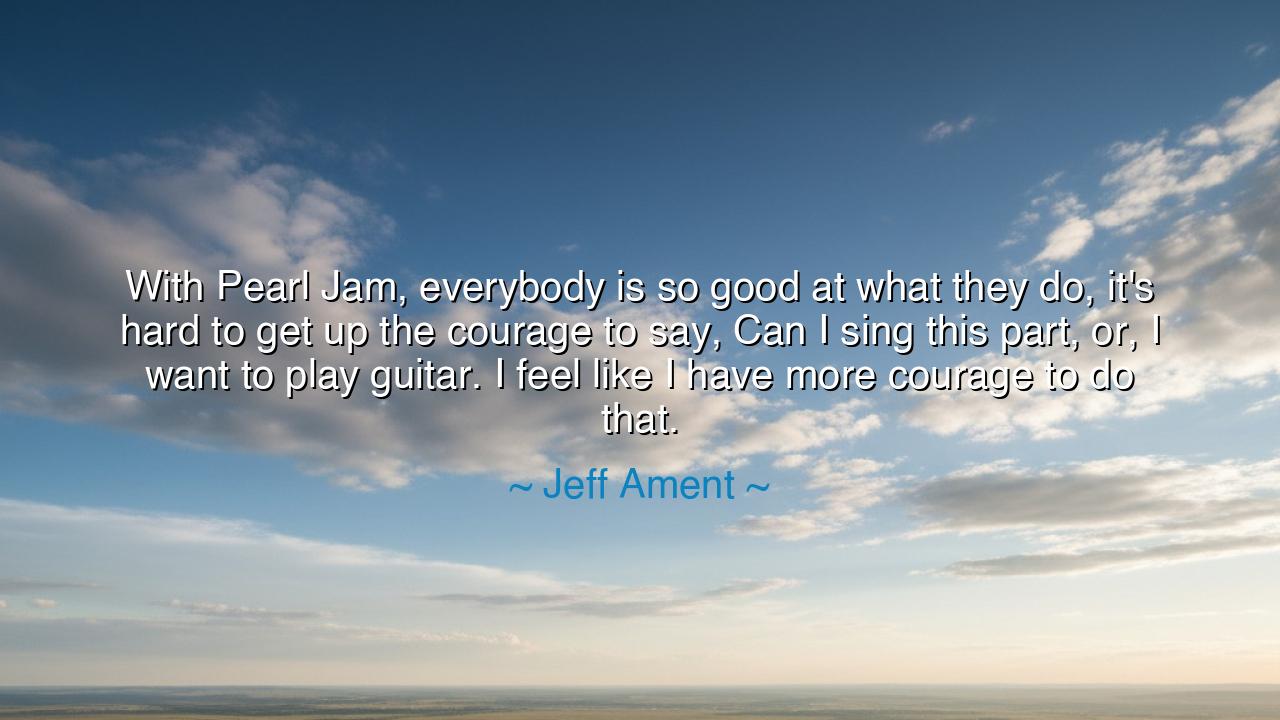
With Pearl Jam, everybody is so good at what they do, it's hard
With Pearl Jam, everybody is so good at what they do, it's hard to get up the courage to say, Can I sing this part, or, I want to play guitar. I feel like I have more courage to do that.






“With Pearl Jam, everybody is so good at what they do, it's hard to get up the courage to say, Can I sing this part, or, I want to play guitar. I feel like I have more courage to do that.”
Thus spoke Jeff Ament, the quiet architect of rhythm and emotion, the bassist whose steady hands have carried the thunder of Pearl Jam through decades of music, rebellion, and truth. In these humble words, he reveals a struggle known not only to musicians but to all who walk the path of creation — the struggle between admiration and courage, between reverence for others and belief in oneself. It is a confession of both humility and awakening: the understanding that even among greatness, one must learn to find one’s own voice.
The origin of this quote lies within the heart of a band that defined a generation. Born in the fires of the early 1990s, when grunge rose as the cry of restless souls, Pearl Jam became not merely a group, but a brotherhood of immense talent — each member a master in his own craft. For Jeff Ament, surrounded by such power — the voice of Eddie Vedder, the passion of Mike McCready, the precision of Stone Gossard, the energy of Matt Cameron — there was both inspiration and intimidation. How does one speak when the air is filled with the sound of giants? Yet Ament’s words mark the moment when admiration transformed into courage: the courage to step forward, to contribute, to create not in comparison but in collaboration.
This is a truth that echoes through the ages. In every circle of excellence, there comes a test not of skill, but of confidence — the courage to claim one’s space amidst greatness. The Greek philosopher Plato once wrote that courage is not the absence of fear, but the judgment that something else is more important than fear. For Ament, that “something else” was expression — the need to give shape to his own inner music, even while standing among legends. His courage was not loud or defiant; it was quiet and noble — the courage of one who chooses to speak when it would be easier to stay silent.
The story brings to mind another artist: Leonardo da Vinci, who, in his youth, worked under the towering shadow of Verrocchio, his master. Legend tells that when Leonardo painted an angel in one of Verrocchio’s works, its beauty surpassed that of the master’s hand. Verrocchio, upon seeing it, laid down his brush, declaring that no longer could he compete with his pupil. But Leonardo’s courage to paint — to offer his gift even within the domain of greatness — changed the course of art forever. Thus, we see that to contribute one’s voice to a symphony of masters is not arrogance, but duty. Greatness does not diminish in sharing; it multiplies.
Ament’s words remind us that courage is not only for warriors or kings — it is also for artists, thinkers, and dreamers. To create in the company of excellence is to wrestle with self-doubt, to wonder whether one’s ideas are worthy. Yet true courage, as he discovered, is not born of ego, but of authenticity — the willingness to bring forth what is uniquely yours, even when surrounded by brilliance. It is the quiet act of saying, “I belong here too.” The world’s great works — the music, the art, the discoveries — have all been born from this same spirit of courage: the belief that one’s own voice, however small, has something to offer the eternal chorus of humanity.
In these words, there also lies a deeper lesson about community and humility. The courage Ament speaks of is not to dominate or overshadow, but to harmonize. It is the courage of participation, not conquest. In a true fellowship, each member’s strength enhances the other’s. The river of creativity flows strongest when every tributary dares to meet it. Ament’s awakening teaches us that belonging among greatness is not a matter of equality of skill, but equality of spirit — the willingness to give what one has, and to give it wholly.
So, my child, take this teaching into your own heart. Do not silence your gifts out of reverence for others. Admire greatness, but let that admiration be a fire, not a chain. When surrounded by those who shine, do not retreat into shadow — instead, add your own light. Have the courage to say, “Can I sing this part?” not because you wish to be seen, but because your soul must speak. For silence may feel safe, but expression is divine. And know this: in the symphony of life, every voice that dares to sound enriches the whole.
Thus, remember Jeff Ament’s wisdom — that courage and humility are not opposites, but companions. The truest strength lies not in standing alone, but in standing beside others, brave enough to share your own truth. When you find yourself among greatness, do not shrink; rise. The masters of your world do not need your silence — they need your courage. For only when every voice sings freely, does the music of life become complete.






AAdministratorAdministrator
Welcome, honored guests. Please leave a comment, we will respond soon